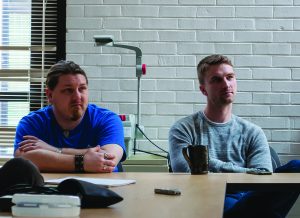By Cory A. Thompson – [email protected] – Asst. A&F Editor
UNC Asheville students dined with a group of activists from Cairo via teleconference and discussed the recent climate of Egyptian political unrest.
“The idea is to get two groups of people from different parts of the world and establish this abstract but issue-based, connection,” said Oguz Erdur, an assistant professor of anthropology and the faculty advisor in Asheville’s iteration of the Virtual Dinner Guest Project. “It’s a good reminder that we could talk to anyone, anywhere in the world if they were waiting for us on the other end of a videoconference call. We don’t do that enough.”
Eric Maddox, a Brooklyn filmmaker, created the Virtual Dinner Guest Project as a way to bridge the gap between faraway cultures through food and conversation. Asheville participated in a new version of the initiative, the Virtual Dinner Guest Project 2.0, in which participants in both countries make videos for each other.
The videos, available online, capture the words of everyday people in both countries. At the end of the first dinner, which occurred last April, the participants drew up a question. In the following week, the UNCA students hit the streets.
“We interviewed 22 people on a Sunday afternoon in Asheville,” Erdur said. “We asked them, ‘If you had the attention of all 84 million people in Egypt, what would you say to them?’”
According to the participants, the responses of their fellow Ashevillians underwhelmed.
“Everyone we interviewed got a place in the video,” said Jason McDaniel, a senior history student. “Whether they had something to say or they had nothing at all to say, they still got a place in the video.”
According to McDaniel, it stands to reason the average American is under-informed about the nature of Egyptian politics.
“The Egyptian people are affected by American policies, so they watch our media and stay informed. The average American isn’t affected by Egypt, and people don’t spend mental energy on things that don’t affect them,” McDaniel said. “After all, how many people do you know that actually watch Al Jazeera?”
With a week until they were to present their video to their new Egyptian friends, Jethro Waters, a UNCA documentary producer and alumnus, said it was difficult to decide how to frame the words of their interviewees.
“We were really concerned with the power you have to make people look like idiots or look really smart,” Waters said. “We had to tell our Egyptian friends that Asheville is kind of a unique place.”
Finally sitting in front of the party from Egypt, Waters said his misgivings about the project melted away.
“Right from the get-go, these people felt like they had people they could communicate with, people they could touch,” Waters said. “Once they realized we were willing to hear anything and we wanted to hear it, for personal and educational reasons, they were really open and honest.”
According to Erdur, the Egyptians had no trouble communicating their feelings about the Asheville street interviews.
“Some of the people in Egypt were incredibly upset,” said Erdur. “Comparing the two videos was like a slap to the face.”
Beth Hinson, a senior American sociology student at UNCA, said she can understand why the Egyptians would be upset.
“One thing that bothered us about our interviews is that the people we talked to seemed to be trying to tell Cairo what to do,” Hinson said. “The people interviewed in Cairo asked America to educate themselves about Egypt and the world, and all of our American interviewees had advice.”
Staci Benson, a sociology student at UNCA, said people forget some of the most humanizing, important details when they see foreign conflict on the news.
“When we see a country going through political turmoil, we think that’s the only thing going on. We forget that these people have daily lives, but that’s just not true. One of the participants we dined with became a father after the project, another woman got married and is expecting a child,” Benson said. “We can’t get lost in the political mumbo jumbo and forget that these people have daily lives and struggles, just like we do.”
The Virtual Dinner Guest Project aims to cut through the formality and the complications that beset other forms of international communication. According to Hinson, the plan works.
“I don’t know how this happened, but for the second dinner, we had traditional Arabic foods and they ended up with hamburgers and fries,” Hinson said. “I was humbled by the experience.”

Photo by Will Breedlove – Staff Photographer
Categories:
UNCA students and staff connect with Egyptian activists
February 26, 2014
0
More to Discover

















